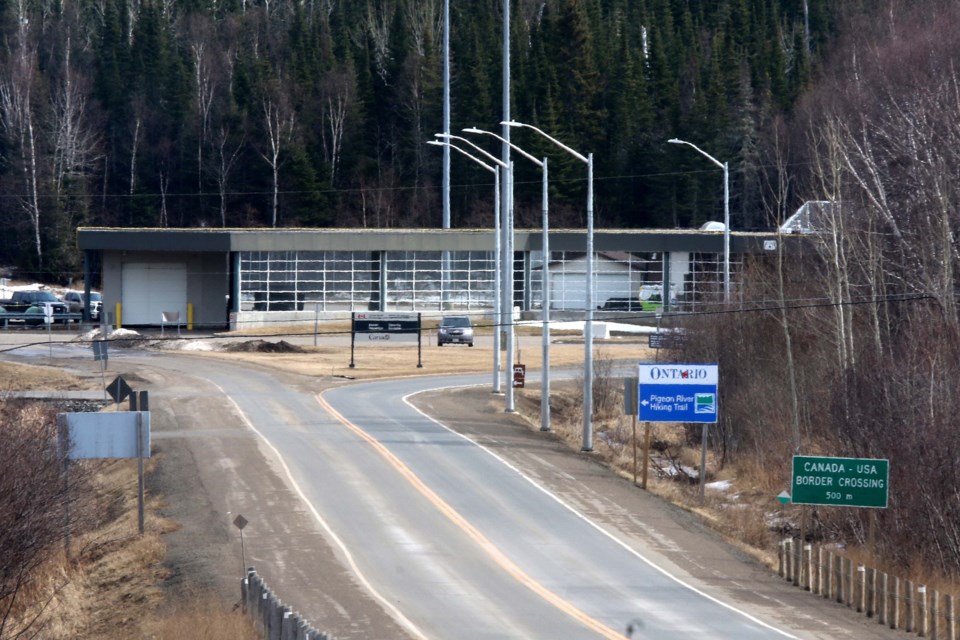THUNDER BAY – Canada Border Services Agency is ramping up for an expected surge in travelers looking to cross into Canada.
As of Tuesday, fully vaccinated Canadians will be able to make out-of-country trips of less than 72 hours in duration without the need to provide a molecular COVID-19 test to re-enter Canada without having to quarantine for 14 days.
The move comes weeks after the United States reopened its land and water borders to fully vaccinated travelers, the decision coming 20 months after Canada and the U.S. closed the borders between the two countries.
Charles Fischer, a CBSA representative at the Pigeon River border crossing, said traffic heading north into Canada from Minnesota is currently at three to six per cent of normal travel levels for this time of year, when thousands flock south to take advantage of Black Friday deals.
“There’s not much personal traffic going on,” said Fischer, who added he’s got no clue what to expect on Tuesday.
“Right now it’s heavily tilted toward trade and transport, cross-border business, that type of thing.”
While the need for a PCR test has been lifted for day trips and short jaunts less than 72 hours, returning Canadians are still required to present their vaccination status when re-entering the country, and must upload any required information, including proof of vaccination, through the ArriveCan app.
Do your homework, Fischer cautioned.
“You need to do a few things. One of those is you need to submit your info through the ArriveCan app. If you don’t have a smart phone, you can access it online through a portal. In the app you’re going to submit your vaccine information. You’re going to submit your information about who you are. And it’s going to ask you some questions that you’ll have to fill out,” Fischer said.
“And that needs to be done before you get to the border. It’s a requirement. If you show up and you haven’t submitted your information into ArriveCan, you can be put into quarantine for 14 days. If you’re put into quarantine at the border, you’re legally obligated to carry that quarantine out.”
Failing to do so could result in a fine of up to $750,000 and/or up to six months behind bars.
Non-vaccinated and partially vaccinated Canadians who might slip through the U.S. screening protocols – the Americans are not expected to ask every traveller for proof of vaccination – will automatically have to quarantine for 14 days.
Fischer said travellers should also be prepared for longer wait times at the border, noting a 60-second screening from pre-COVID times could take up to three minutes. An expected rush at the border, particularly in Thunder Bay where thousands of parcels are being held at Ryden’s Border Store, will also likely mean longer lines in both directions.
Some returning travellers could also be randomly selected to do a mandatory take-home COVID-19 test. Foreign travellers, those not considered citizens, permanent residents or people registered under the Indian Act, must still present a negative PCR test to be permitted entry into Canada, regardless of length of stay.
Dr. Janet DeMille, medical officer of health at the Thunder Bay District Health Unit, asked local residents to use caution if they decide to cross in to the United States, particularly into Minnesota, which has the second-highest per-100,000 case count in the country, at 76, trailing only Michigan. Cook County is only averaging 1.6 cases per day, according to the New York Times.
“You need to be careful if you go to Minnesota,” DeMille said. “We know all the measures to take to reduce the risk of getting COVID. Minnesota does have really rates right now ... You can only go if you’re fully vaccinated, so that’s really good.
“Ideally, don’t hang out with any people that are sick or have symptoms, because you could be exposed and become infected. Wear a mask, maintain two metres of distance and be outside as much as you can.”
Fischer reminded travellers that the 72-hour window is firm, and anyone showing up even a few minutes late will be required to produce proof of a negative PCR test or face quarantine and possible legal ramifications.



